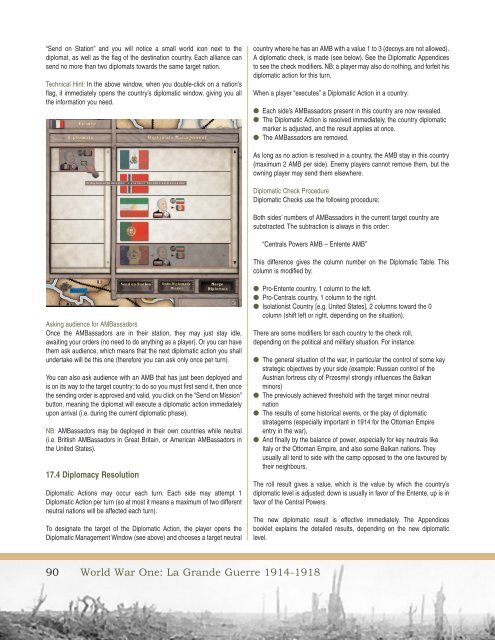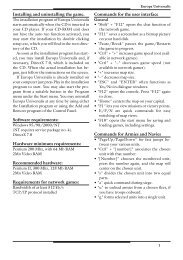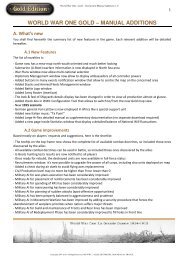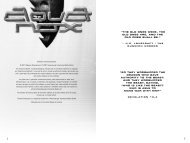Create successful ePaper yourself
Turn your PDF publications into a flip-book with our unique Google optimized e-Paper software.
“Send on Station” and you will notice a small world icon next to the<br />
diplomat, as well as the flag of the destination country. Each alliance can<br />
send no more than two diplomats towards the same target nation.<br />
Technical Hint: In the above window, when you double-click on a nation’s<br />
flag, it immediately opens the country’s diplomatic window, giving you all<br />
the information you need.<br />
Asking audience for AMBassadors<br />
Once the AMBassadors are in their station, they may just stay idle,<br />
awaiting your orders (no need to do anything as a player). Or you can have<br />
them ask audience, which means that the next diplomatic action you shall<br />
undertake will be this one (therefore you can ask only once per turn).<br />
You can also ask audience with an AMB that has just been deployed and<br />
is on its way to the target country: to do so you must first send it, then once<br />
the sending order is approved and valid, you click on the “Send on Mission”<br />
button, meaning the diplomat will execute a diplomatic action immediately<br />
upon arrival (i.e. during the current diplomatic phase).<br />
NB: AMBassadors may be deployed in their own countries while neutral<br />
(i.e. Britlish AMBassadors in Great Britain, or American AMBassadors in<br />
the United States).<br />
17.4 Diplomacy Resolution<br />
Diplomatic Actions may occur each turn. Each side may attempt 1<br />
Diplomatic Action per turn (so at most it means a maximum of two different<br />
neutral nations will be affected each turn).<br />
To designate the target of the Diplomatic Action, the player opens the<br />
Diplomatic Management Window (see above) and chooses a target neutral<br />
90 World War One: La Grande Guerre 1914-1918<br />
country where he has an AMB with a value 1 to 3 (decoys are not allowed).<br />
A diplomatic check, is made (see below). See the Diplomatic Appendices<br />
to see the check modifiers. NB: a player may also do nothing, and forfeit his<br />
diplomatic action for this turn.<br />
When a player “executes” a Diplomatic Action in a country:<br />
● Each side’s AMBassadors present in this country are now revealed.<br />
● The Diplomatic Action is resolved immediately, the country diplomatic<br />
marker is adjusted, and the result applies at once.<br />
● The AMBassadors are removed.<br />
As long as no action is resolved in a country, the AMB stay in this country<br />
(maximum 2 AMB per side). Enemy players cannot remove them, but the<br />
owning player may send them elsewhere.<br />
Diplomatic Check Procedure<br />
Diplomatic Checks use the following procedure:<br />
Both sides’ numbers of AMBassadors in the current target country are<br />
substracted. The subtraction is always in this order:<br />
“Centrals Powers AMB – Entente AMB”<br />
This difference gives the column number on the Diplomatic Table. This<br />
column is modified by:<br />
● Pro-Entente country, 1 column to the left.<br />
● Pro-Centrals country, 1 column to the right.<br />
● Isolationist Country [e.g. United States], 2 columns toward the 0<br />
column (shift left or right, depending on the situation).<br />
There are some modifiers for each country to the check roll,<br />
depending on the political and military situation. For instance:<br />
● The general situation of the war, in particular the control of some key<br />
strategic objectives by your side (example: Russian control of the<br />
Austrian fortress city of Przesmyl strongly influences the Balkan<br />
minors)<br />
● The previously achieved threshold with the target minor neutral<br />
nation<br />
● The results of some historical events, or the play of diplomatic<br />
stratagems (especially important in 1914 for the Ottoman Empire<br />
entry in the war),<br />
● And finally by the balance of power, especially for key neutrals like<br />
Italy or the Ottoman Empire, and also some Balkan nations. They<br />
usually all tend to side with the camp opposed to the one favoured by<br />
their neighbours.<br />
The roll result gives a value, which is the value by which the country’s<br />
diplomatic level is adjusted: down is usually in favor of the Entente, up is in<br />
favor of the Central Powers.<br />
The new diplomatic result is effective immediately. The Appendices<br />
booklet explains the detailed results, depending on the new diplomatic<br />
level.
















